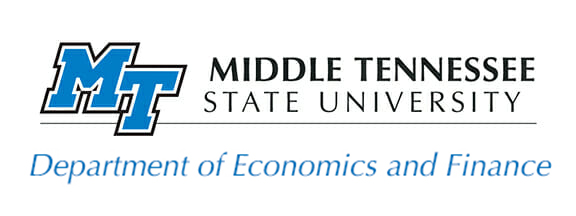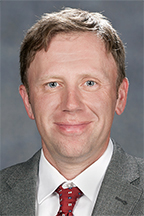When MTSU doctoral student Yolunda Nabors learned that tuition for her fifth and final year of her Ph.D. in Economics Program would be fully covered along with a generous stipend, she was in total disbelief.
“It was a total surprise!” Nabors said about the email from the College of Graduate Studies announcing her win. “It was such a relief to know that my tuition would be covered for the academic year and that I would receive a stipend to assist with my education.”

Nabors was named the university’s first recipient of the Tennessee Doctoral Scholar fellowship, a Tennessee Higher Education Commission program designed to “increase the number of minority students who earn a Ph.D. in Tennessee and to encourage these graduates to seek faculty positions by providing financial assistance for up to three years of graduate study,” according to the program’s website.
Specifically, participating institutions waive the recipient’s tuition and provide a faculty advisor for the length of the program. The state’s Contract Education grant gives the winner a $20,000 annual stipend plus additional funds for research and professional development.
As a full-time senior lecturer at Tennessee Tech University in Cookeville, Tennessee, and a full-time doctoral student, Nabors said she didn’t have much time or funding to focus solely on her research before the fellowship.
“Now I have written research papers and am currently working on research investigating the effects of changes in the Affordable Care Act on vulnerable communities,” said the Columbus, Mississippi, native. “I have traveled and presented my research at academic conferences.”

Nabors said she chose MTSU’s doctoral economics program because its straightforward, accelerated program design fit well with her work commitments.
“Even more importantly, I saw that students who graduated from the program were able to secure both academic and private sector employment,” Nabors said, “so I knew that this program would help me obtain my career goals.”
Nabors said the program’s faculty is another of its greatest strengths.

“Prior to entering the program, I felt that I would have difficulty understanding and applying econometric models, but (program director) Dr. Adam Rennhoff explained the theory and applications of various econometric models thoroughly and made modeling approachable,” she said.
“Dr. Charles Baum’s micro theory and labor economics courses provided me a more in-depth understanding of economic theory. This greatly influenced my teaching. I became more confident and comfortable when explaining theory and even gained better insight into the application thereof.”
More accolades for the program
Rennhoff, who became program director in 2015, said the economics field has historically done a poor job of supporting women and underrepresented minorities, which makes the Tennessee Doctoral Scholar fellowship an important mechanism to support this student group’s career development.
“(And) there’s a nice morale boost for students to become aware that one of their peers has earned external recognition,” Rennhoff said.
Along with earning a U.S. News and World Report ranking last year, Rennhoff said the program’s strengths are its faculty; a well-organized, four-year curriculum; and the presence of its graduates now employed across academia, the government and the private sector.

“We have graduates doing some amazing things, from forecasting economic trends for FedEx to evaluating the economic benefits of new prescription drugs at the FDA to providing data analysis to renewable energy companies,” Rennhoff said. “The degree can open many different doors for students.”
Rennhoff worked with Nabors before she enrolled to create a flexible, personalized schedule to accommodate her full-time teaching load.
“If you look around at other programs, most graduates finish in five, six years or some even longer!” Rennhoff said. “Our program gives students the tools they need and helps them get out the door and on to their full-time employment.
“We are willing to work with students to try and find a plan that works for them,” he said.
To learn more about MTSU’s Ph.D. in Economics program, visit the website at www.mtsu.edu/programs/economics-phd.
— Stephanie Wagner (Stephanie.Wagner@mtsu.edu)


COMMENTS ARE OFF THIS POST